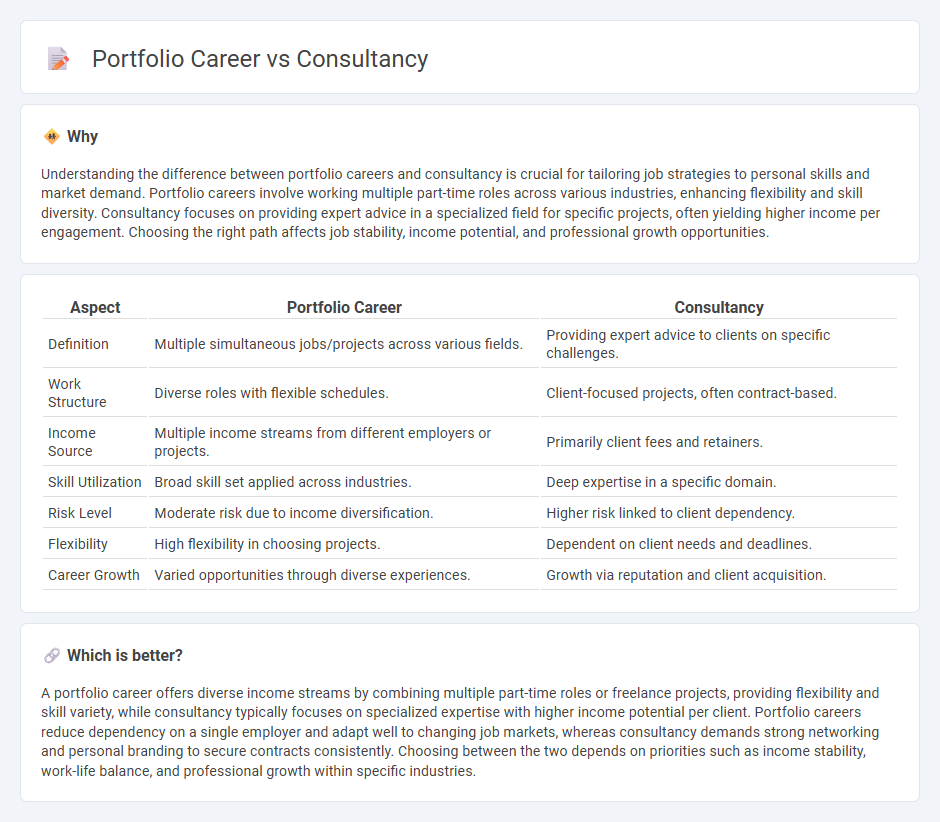
A portfolio career combines multiple part-time jobs, freelance projects, and entrepreneurial ventures, offering diverse income sources and skill development opportunities tailored to personal goals. Consultancy focuses on providing expert advice and solutions to organizations, often involving project-based work that leverages specialized knowledge in industries like management, IT, or marketing. Discover more about how these employment models can shape your professional journey and financial stability.
Why it is important
Understanding the difference between portfolio careers and consultancy is crucial for tailoring job strategies to personal skills and market demand. Portfolio careers involve working multiple part-time roles across various industries, enhancing flexibility and skill diversity. Consultancy focuses on providing expert advice in a specialized field for specific projects, often yielding higher income per engagement. Choosing the right path affects job stability, income potential, and professional growth opportunities.
Comparison Table
| Aspect | Portfolio Career | Consultancy |
|---|---|---|
| Definition | Multiple simultaneous jobs/projects across various fields. | Providing expert advice to clients on specific challenges. |
| Work Structure | Diverse roles with flexible schedules. | Client-focused projects, often contract-based. |
| Income Source | Multiple income streams from different employers or projects. | Primarily client fees and retainers. |
| Skill Utilization | Broad skill set applied across industries. | Deep expertise in a specific domain. |
| Risk Level | Moderate risk due to income diversification. | Higher risk linked to client dependency. |
| Flexibility | High flexibility in choosing projects. | Dependent on client needs and deadlines. |
| Career Growth | Varied opportunities through diverse experiences. | Growth via reputation and client acquisition. |
Which is better?
A portfolio career offers diverse income streams by combining multiple part-time roles or freelance projects, providing flexibility and skill variety, while consultancy typically focuses on specialized expertise with higher income potential per client. Portfolio careers reduce dependency on a single employer and adapt well to changing job markets, whereas consultancy demands strong networking and personal branding to secure contracts consistently. Choosing between the two depends on priorities such as income stability, work-life balance, and professional growth within specific industries.
Connection
Portfolio careers involve managing multiple part-time roles or projects simultaneously, often across different industries. Consultancy serves as a key component of portfolio careers by offering experts flexible, project-based work that leverages specialized knowledge. This synergy allows professionals to diversify income sources while maintaining autonomy and continuous skill development.
Key Terms
Specialization
Specialization in consultancy centers on deep expertise in a specific industry or skill set, providing clients with targeted solutions and strategic guidance. A portfolio career combines multiple specializations, allowing professionals to diversify their skills and income streams across various roles or projects. Explore how focusing on specialization can shape your career path and unlock new opportunities.
Flexibility
Consultancy offers project-based work that allows professionals to choose assignments aligning with their expertise, providing substantial flexibility in workload and schedule. Portfolio careers combine multiple income streams from various roles or projects, enabling individuals to diversify skills and income sources while maintaining control over time allocation. Explore the unique flexibility advantages of each path to determine the best fit for your career goals.
Client Management
Consultancy roles emphasize direct client management through tailored problem-solving and strategic advice, fostering strong relationships and ongoing engagement. Portfolio careers involve managing multiple clients or projects simultaneously, requiring versatility and efficient time allocation to meet diverse expectations. Discover strategies to excel in client management across both career paths.
Source and External Links
What is consulting? | Consultancy.in - Consulting is the practice of providing independent, specialist advice and implementation support to organizations across industries, typically focused on business strategy, management, and technology.
What is consulting? - Consultancy.org - Consultants offer expertise to clients in exchange for a fee, delivering either advisory or hands-on implementation services while maintaining an objective, unbiased perspective.
34 Types of Consulting Services to Offer Clients - Paperbell - Consultants are business experts who specialize in areas like strategy, technology, or operations, providing tailored solutions to help clients address specific challenges or objectives.
 dowidth.com
dowidth.com